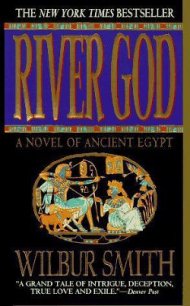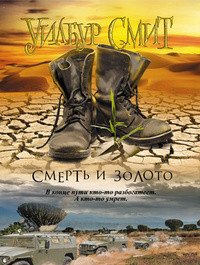Men of Men - Smith Wilbur (книги бесплатно без txt) 📗
He went back quickly and pulled the red ox out of the tangle by the rein about his horns.
"Dutchman he named him, for no good reason.
"Come, you red thunder!"
And he put him into the lead file beside Sathan and called to them quietly.
"Donsa, Sathan, pull. Pakamisa, Dutchman, pick up the chain!"
Obediently the pair of bullocks straightened their forelegs and leaned forward against the yoke, and a miracle happened. The long heavy silver chain from the disselboom came up straight and hard as an iron bar, and those animals on the ground were forced to lunge up onto their feet, those that had backed out were pulled into the span, horns and heads pointing forward. In that moment Ralph learned the single most important rule of the open road, keep the chain straight and true, and all else is possible.
Now the little Zulu moved with a deceptively casual air along the double rank of bullocks, touching and talking and wheedling.
"Hey! Fransman, I can see by your wise and beautiful eyes that you were born to the wheel!" And the sturdy black and white beast was led back to his position at the off-wheel.
It took ten minutes, and then the Zulu put the long lash into the air. It hissed like a black mamba and then snaked forward over the ears of the team, not touching a single hair as it fired explosively. The heavy wagon jolted, the white canvas tent that covered the rear half of the long body shook like the unfurling mainsail of a tall ship and then it was rolling away smoothly.
The Zulu crinkled his eyes at Ralph and called a question. "Yapi?
Where? Which way?"
"Yakatol" Northr Ralph shouted back joyously, and despite himself Bazo snatched up his war shield and assegai and whirled into a frenzied challenge dance, leaping and stabbing at a host of imaginary enemies, shouting defiance and ecstasy to all the world.
The road to the Vaal river was the first leg of the journey, and the ruts were axle deep, and red soil raw as a fresh wound, the dust a fog in the windless air through which it was just possible to make out the horns of the two wheeler bullocks. The dust hid from Ralph his parting view of the sprawling town, and its high stagings above the gaping hole which had been his home and his prison for so many years, and by the time that the other traffic on the road had thinned sufficiently for the dust cloud to settle, they had made five miles and the stagings might have been merely a distant line of dead thorn trees silhouetted against the sunset.
The little Zulu called to his boy who led the front oxen, and the child swung them off the road, and the high rear wheels bumped out of the ruts and then crunched through crisp winter grass as the wagon rolled towards a spreading umbrella-shaped acacia which would "We their shelter and firewood for the night.
Walking at the front wheel Ralph pondered the two unexpected additions to his company.
The child had come out of the curtain of red dust, naked except for the little flap of his mutsha in front, cooking-pot and with the roll of sleeping-mat balanced upon his head.
He had placed these meagre possessions on the tailboard of the wagon and then, at a nod and a word from the Zulu, had taken the lead rein and plodded solemnly ahead of the span, his bare feet sinking ankle-deep in the powder dust.
Ralph wondered how old he was, and decided he could not be more than ten years of age.
What is his name?" he asked the Zulu.
"A name?" The little man shrugged. "It is not important. Call him Umfaan, the Boy."
And what is your name?" Ralph went on, but the little driver suddenly had urgent business at the head of the span and perhaps the dust had clogged his ears for he did not seem to hear the question.
Ralph had to ask the question again, after the outspan, when the Zulu was squatting beside the cooking fire watching Urnfaan stir the maize-meal in the black pot.
"What is your name?" And the Zulu smiled as though at a secret thought, and then he said: "A name can be dangerous, it can hover over a man like a vulture and mark him for death. Before the soldiers came to the royal kraal at Ulundi, I was called one thing-' Ralph stirred uncomfortably at the reference to the battle that had ended the Zulu War. The tattered tunic that the Zulu wore had once been the same dark blue as that of the Natal police uniform and one of those rents in the faded cloth might have been made by the stabbing blade. Lord Chelmsford had sent the Zulu king and most of his indunas in chains to the island of Sint Helena, where another emperor had died in captivity. However, some of his fighting chiefs had escaped from Zululand and now wandered homeless exiles across the vast continent. The driver wore the head-ring of an induna.
It was a name which men once spoke carefully, but I have not heard it for so long now that I have forgotten it," the Zulu went on, and again Ralph wondered if there was a legend still alive amongst the defeated Zulu of a little induna, smaller than the tall warriors he commanded and wizened far beyond his years, who had led them in that terrible charge into the English camp below the Hill of the Little Hand.
In the firelight Ralph studied the Zulu's tunic again, and he told himself that it was unlikely that it had been taken from the corpse of an Englishman on that grisly field; yet he shivered briefly although the night was warm.
"Now you have forgotten that name?" he encouraged, and the Zulu crinkled his eyes again.
"Now I am called Isazi, the Wise One, for reasons that should be clear even to a Matabele."
Across the fire Bazo snorted disdainfully, then stood and walked out of the firelight, into the darkness where the jackals piped plaintively.
"My name is Henshaw," Ralph told him. "Will you stay with me and drive my wagon all the way?
"Why not, Little Hawk?"
"You do not ask where I am going."
"i need a road." Isazi shrugged. "The one to the north is no longer or harder than the road to the south."
The jackal yipped again, but much closer this time, and Bazo paused, changed the assegai to his right hand, and answered the cry, cupping his palm over his mouth to give resonance to the sound; and then he moved on to where a small stone kopje shone in the moonlight like a pile of silver bullion.
"Bazo!" The greeting was a whisper, soft as the night wind in the pale grass, and a shadow stepped from amongst the moon shadows at the base of the kopje.
"Kamuza, my brother." Bazo went to him and embraced him, open hands upon his shoulders.
"i have a stone in my belly, heavy with sorrow at this parting."
"We will share the road again, one day, we will drink from the beer pot and fight with our shoulders touching-" Kamusa answered him quietly. "But now we are both upon the king's business."
Kamuza slipped the thongs that held his kilt in place, and it sagged heavily to his knees, leaving him naked.
"Hurry," he said. "I must return before the curfew bell."
Since the Diamond Trade Act, blacks were not allowed on the streets of Kimberley once the curfew bell had rung.
"You were not marked by the police?" Bazo asked, as he removed his own kilt and changed it with Kamuza.
"They are everywhere, like pepper ticks in the new spring grass," Kamuza grunted. "But I was not followed."
Bazo weighed the fur kilt in both hands while Kamuza swiftly belted the replacement about his own waist.
"Show me," Bazo said, and Kamuza took the kilt back from his hands and spread it on one of the flat moonwashed boulders.




